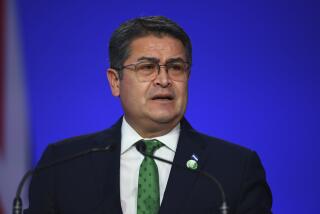Court Scales Back Pinochet Charges
- Share via
BUENOS AIRES — A Chilean appellate court weakened the criminal case against former dictator Augusto Pinochet on Thursday, dismissing charges of homicide and kidnapping but ruling that he can be tried on charges that he covered up abuses by a military death squad after his 1973 coup.
Although Chile’s center-left government insists that the justice system has acted independently in the Pinochet prosecution, Thursday’s 2-1 ruling was seen as a compromise in the slow-moving, highly politicized case. Overall, the ruling appeared more favorable to Pinochet than to his opponents.
Movement toward a trial--a lengthy, paper-driven process under Chilean law--will continue. Pinochet will remain under house arrest at his country home 90 miles from Santiago, the capital. He has been held there since the Supreme Court allowed his indictment to go forward more than a month ago.
But the ailing 85-year-old no longer stands accused of 57 homicides and 18 kidnappings committed by the helicopter-borne “caravan of death” across northern Chile soon after the imposition of his 17-year regime. The prosecution had alleged that the secret unit, led by a general carrying a letter signed by Pinochet, acted on the dictator’s direct orders when its members dragged political prisoners out of jails and massacred them. The strongest witnesses against Pinochet were former high-ranking military officers disgusted by the atrocities.
In a clear victory for Pinochet, however, the appellate panel accepted the argument in the defense appeal that the former dictator was not the mastermind of the caravan of death. Thursday’s ruling states that the death squad chief, Gen. Sergio Arellano, acted on his own initiative.
The judges ruled that the evidence indicates that Pinochet learned of the crimes after the fact and failed to punish those involved. Theoretically, Pinochet still faces prison time if convicted of a cover-up.
Lawyers for families of the victims called the ruling a partial triumph. Nonetheless, they accused the courts of caving in to pressure from Pinochet’s still influential power base in the military and rightist political parties.
Eduardo Contreras, an attorney for Chile’s small Communist Party, said the decision to throw out the more serious charges “can only be explained by the strange political climate that we are experiencing.”
Contreras singled out an interview published Sunday in which the Supreme Court’s president, Hernan Alvarez, asserted that the painful debate over human rights abuses during the dictatorship required a political solution. Alvarez’s comments may have influenced the lower-ranking appellate judges, according to Contreras and other critics.
Chile’s influential El Mercurio newspaper quoted Alvarez as saying: “There should be a political solution, because we are facing problems with political connotations. We cannot be asked to resolve them.”
Pinochet’s partisans were not pleased with the ruling, either. They say Pinochet is being persecuted after saving the country from Marxism.
“I can’t be in agreement, because our goal was that the courts drop the prosecution,” said retired Gen. Guillermo Garin, former deputy chief of the army and a Pinochet stalwart. “He has no responsibility whatever for the crimes with which he is charged.”
The ex-dictator’s defense team still has a shot at getting Pinochet off the hook. The Supreme Court will soon consider a motion asking that the case be thrown out on grounds of the defendant’s ill health. Pinochet wears a pacemaker, has suffered several strokes and, according to recent court-supervised medical exams, suffers from “moderate dementia.”
Last year, Pinochet’s ailments caused British authorities to send him home rather than go forward with an extradition request by a Spanish judge who wanted to try him on torture charges. Chilean law, however, allows defendants to avoid trial only if they are mentally ill.
Unlike previous rulings in the legal saga, Thursday’s opinion had a ring of finality. The prosecution cannot appeal the decision, although it can ask higher courts for a more limited “judicial revision.”
More to Read
Sign up for Essential California
The most important California stories and recommendations in your inbox every morning.
You may occasionally receive promotional content from the Los Angeles Times.













